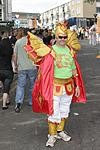For us young priests sailing for the W. Indies was an
exciting journey into the unknown, the exotic tropical island of Grenada. Our speedy dispatch allowed no time to learn
about its history and culture. After
years of philosophy and theology we were eager to get on with the work to which
we’d been called. We were so urgently
needed that we were exempted from the usually required course of Pastoral
Training. We were thrown in at the deep end and
expected to learn to swim.
Getting there meant embarking at Liverpool docks on a wet,
cold, foggy November night. Our ship,
the ‘Hilary’, was a ‘Distinguished Old
Lady.’ She had served gallantly during the War -in
the invasion of Sicily, the Atlantic Convoys, the D. Day Landing. She had survived being hit by a torpedo,
which fortunately didn’t explode.
Now-a-days people fly
to their postings in the W. Indies in a matter of hours. Not us.
We would cruise at a leisurely pace and our journey would take nineteen
days. That in itself was a real holiday,
a wonderful, colourful experience. We
had been warned that the Bay of Biscay could be rough -but not for us. Instead, it was as calm as the proverbial
mill pond, covered by a dense fog. Our
speed was reduced to dead slow; around us fog horns lowed like a heard of mournful cows, hopefully preventing us from crashing
into other ships. It was all so still
and eerie.
Life on board was colourful.
Among our fellow passengers there
was a number of W. Indians, who delighted us with calypsos. The First Class passengers
decided that they gave us a much better time than the entertainment provided for
them. So, they joined us in their formal
evening dress after their dinner. (I
doubt if we would have been allowed to join them!)
Many ocean-going ships have a chapel. Not ours.
When the sea was sufficiently calm we could say Mass in the bar, before
the other passengers were up. Not a
particularly devotional atmosphere, with chairs stacked on the tables and a
pervading smell of stale beer -not incense.
With some of the passengers joining us, we formed a miniature Pilgrim
Church.
Our long voyage was punctuated by the exotic colours and
sights of the places we visited -Vigo, Lisbon and Madeira, where we made a pilgrimage round its famous
wine cellars, taking a sample at each.
From Madeira we set out on the long haul to Barbados and then Trinidad. Gradually the temperature became hotter;
that helped to prepare us for working in a tropical climate. From Trinidad we flew to Grenada. As we
stepped off the plane we were struck by a blast of hot air, as though someone
had just flung open a furnace door. The
atmosphere was strongly perfumed by the spices for which Grenada is famous.
Reflecting on our voyage to the W. Indies, to share the Good
News, sums up what is true for all Christians.
As members of the Pilgrim Church, we have been commissioned to proclaim
the Good News. We’ve been called to be
working members of the crew, none of us passengers, whatever our age or
strength. Sometimes our journey will be
smooth, at other times rough. Sometimes
we will be lost in a dense fog. (Peter
and I seem prone to that!) But always
Jesus will be leading us to the safe-haven of the Kingdom of Heaven. Bon Voyage!
Isidore O.P.








